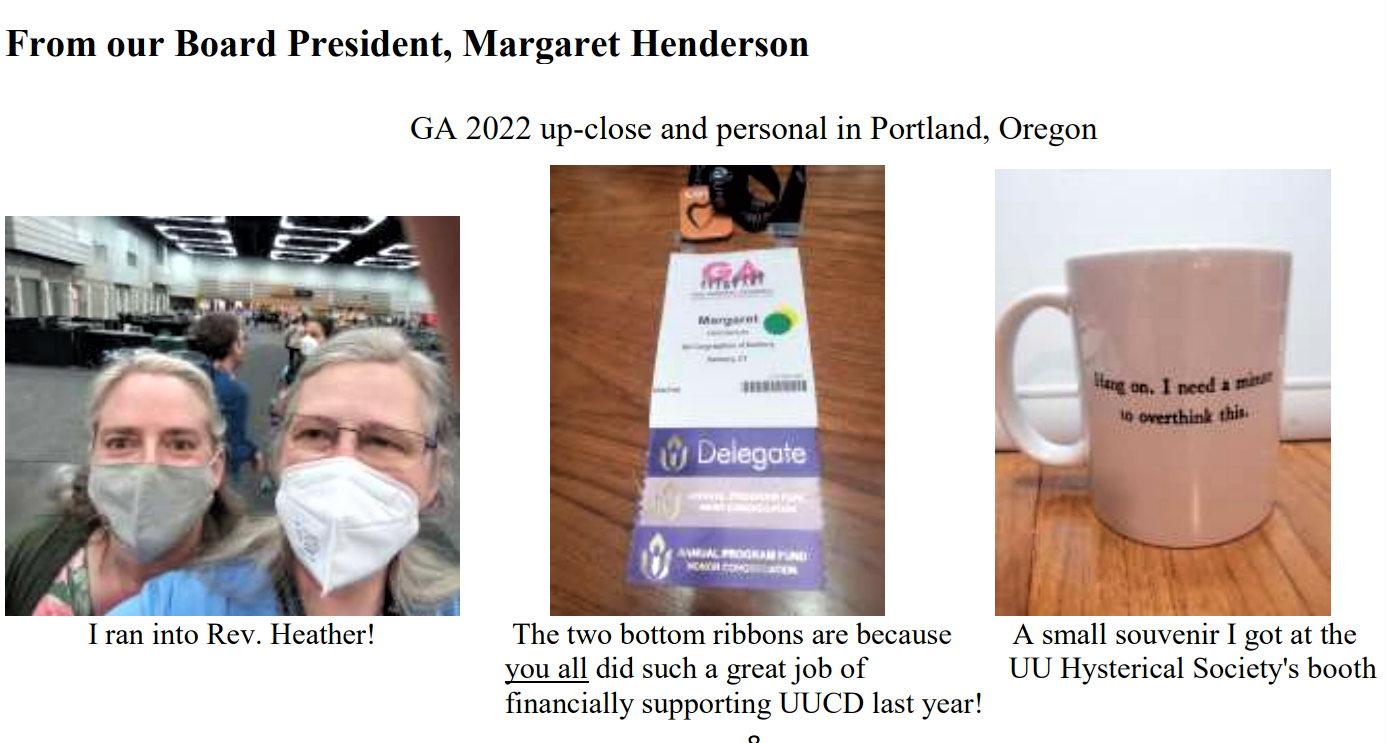
Check out the worship services that took place at our General Assembly in Portland this Summer. Rev. Kathleen’s favorite part of every General Assembly is the variety of worship services. There are services by the UU Christian Fellowship, Church of the Larger Fellowship, Service of the Living Tradition, Bridging service, a huge Sunday service, and more! Check out some of the services that were recorded so that you can see and hear the variety of music, tone, speakers, and ritual. https://www.uua.org/ga/off-site/2022
I was fortunate to attend the UUA’s General Assembly in person this year since my husband has family in Portland. Although it was an enlightening experience, it seemed subdued because of the pandemic. The conference was multiplatform, so there were only about 1400 people there (with 2,000 more online), whereas people have told me there used to be several thousand in-person attendees. The number of in-person sessions each day was limited to one 3-or-4-hour business assembly in the morning, and then one or maybe two breakout sessions in the afternoon. This was to counteract complaints from the previous year that the pace had been too hectic.
Lunches in the cafeteria/exhibit hall were sparsely attended, and people tended to sit 6 feet apart, so there were fewer of those spontaneous conversations with other UU’s. The multiplatform format could have worked really well, but the convention center’s wifi couldn’t handle all of us trying to sign on at once so mostly we couldn’t get internet while we were in the building.
I heard some interesting speakers – Ibram Kendi was particularly edifying as the Ware lecturer – and it was inspiring to watch our national team of officers in action. They were outstanding role models when it came to inclusiveness and diversity, and even when they had to apologize for mistakes they’d made.
Being at GA the day the Roe vs. Wade decision was announced by the Supreme Court was electrifying. UUA President Susan Frederick-Gray announced she was “roiling inside” that day and then looked out at all of us grimly and said, “If you are angry today, you are welcome here!” Many attendees joined the protest that night in downtown Portland.
One of the three Actions of Immediate Witness (AIWs) this year is called “We Do Not Consent” and is directed at supporting reproductive rights. Another is about using restorative justice, including reparations, to live out our anti-racist policies. The final resolution is about stopping the privatization of Medicare, which is apparently continuing unabated in the Biden administration. I hope our congregation can do some work to further these three important goals this year. For more information, go to http://www.uua.org/ga.
So even though it wasn’t quite the thrilling experience of a lifetime that I had hoped for (having never attended GA in person before), it did give me insight, hope and inspiration that I will carry with me all year. General Assembly 2023 is next June in Pittsburgh – who wants to go to Pennsylvania with me?!
From our DRE, Rev. Sierra-Marie Gerfao
General Assembly is a great opportunity to meet Unitarian Universalists from around the country (and world) and attend workshops about a variety of interesting topics, including Religious Education. But it is also the time when we do our business as the Unitarian Universalist Association of Congregations (UUA). I try to pay close attention to that business! Here is some notable business that happened this year:
As the “8th principle” and other anti-racism, anti-oppression efforts have gained momentum in our association, a very small but actively recruiting and slowly growing group of people who are opposed to these efforts have become increasingly organized and strategic. They believe that the UUA is bound to split over these issues, and their stated goal is to be the group in the split that “takes the money and the institution.”
This goal was discussed at a recorded April conference of the Unitarian Universalist Multiracial Unity Action Council, a small organization which seeks to avoid dismantling white supremacy by promoting an outdated color-blind approach that has been ineffective in addressing the effects of racism. This organization functions in sync with a second small organization, called the Fifth Principle Project, which claims that anti-racism, anti-oppression efforts are anti-democratic Comment September 2022 10 and that the naming of harms of racism and oppression conflicts with respect for the worth and dignity of each person (a conflation of people and ideas).
The same goal of institutional takeover was later explicitly promoted by one of this group’s candidates for the UUA Board of Trustees, who made a candidate statement endorsing that “younger and/or marginalized-identifying members” whose efforts she opposes should consider creating their own “branch of Unitarian Universalism,” which she called “21st Century UUs.” (This has prompted a number of General Assembly participants to embrace the term “21st Century UU,” and a number of those attending in-person wore nametag badges identifying themselves as such.)
The methods of those opposing anti-racism, anti-oppression efforts were at least two-pronged during General Assembly. First, they attempted to get two people elected to the UUA Board by petition candidacies, with a stated goal of continuing these efforts in the years to come until they gain a majority on the Board. Their two candidates worked cooperatively, one presenting views of the group explicitly and the other presenting the views in more subtle ways, designed to make her seem a moderate, well-reasoned candidate. However, these candidates received only 9.4% and 10.4% of votes, and fortunately the candidates endorsed by the nominating committee were elected instead.
Second, the group submitted and supported business amendments intended to undermine our current democratic processes such as the requirements for a certain number of petition signatures in order for a petition candidate to run for Board positions. And the group submitted and supported business amendments intended to foster distrust of processes and people involved in an upcoming scheduled review of UUA bylaws.
It was clear that the group have determined the bylaws review is inevitable, but that they wish to establish opportunities for thwarting changes to the bylaws or questioning the legitimacy of the process down the road. Though they effectively suggested that their amendments were reasonable proposals that might be common with any organization’s review of its bylaws, their real concerns did get revealed at one point when a person proposing an amendment complained about the anticipated participation of the 8th principle’s author, Paula Cole Jones, in the bylaws review. Nonetheless, and even while the overall process was approved to move forward, several of their supported amendments passed.
Over the next couple of years as the UUA bylaws are reviewed and revisions are proposed, I encourage you to stay tuned, participate where you can (General Assembly 2023!?!) and bring with you all of your commitments to anti-racism through the dismantling of white supremacy, which led this congregation to approve the addition of the 8th principle to its principles. UUA bylaws will be changing in the coming years, including Article II, which currently is the UUA statement of principles and sources. As a democratic body, the outcomes of this process will be determined by feedback received and votes cast.
From Gina Cassetta
#606 Beloved Conversations: Un/Learning for Liberation; White Anti-Racist Practice
I loved this presentation. Dr. Mark A. Hicks talked about how systems of white supremacy depend on detachment from our bodies, disengaged from connection both to the earth and from one another. Realize that when we create tension in our bodies it helps us to feel in control, but we don’t need to do that. As we work to end oppression, it must be done with practices of joy.
Janine Gelsinger explained how living in a white supremacist system has required us to dial back our emotions in order to suppress empathy for oppressed people. We do not have to prove we are a “good white person.” We practiced some resiliency exercises and were then asked what we felt in our body—was there defensiveness? Click here to Read More
#629 Include Islam in the UU Sources of Inspiration
Though presented poorly, I stuck with it since it was an interesting topic and the arguments seemed valid. The intention was that UU’s should build bridges at this time to challenge Islamophobia, especially as the 8th Principle is to dismantle racism and systems of oppression both within ourselves and our congregations. Read More
#645 Re-Imagining Community: Howard Thurman and UU’s Today Presented by Jessica Hamilton, MDiv, and Rev. Daniel Lawlor This was a fabulous lecture with lots to contemplate! Howard Thurman was born in 1899 and wrote much during the Jim Crow era. A deeply spiritual man, he was a contemplative, a visionary, a mystic who spent much time in nature. Read More
#647, Sacred Earth, Embodied Earth by Rev. Mariela Perez-Simon and Rev. Tania Marquez,
This was a wonderful movement and meditation experience imagining ourselves as a seed and
embodying the nutrients of the four elements as sustenance and support.
I also listened to two lectures regarding Community Ministry since this is an interest of mine : #659: Breadth and Depth of Community Ministry with Rev. Erin Walter and Ben Gabel, lay Community Minister, and Community Ministry 101 moderated by Erin Walter. They both recognized that community ministry helps us open doors to oppressed people and apply our ministry outside the walls of our congregations. Lots of practical advice given here.
#618 A Faith-Based Response to Homelessness by Antoinette Scully
This detailed how she created the No-Ho Homeless Drop-in Shelter in L.A. to be a safe place of support without shame. Read More
#415 WARE Lecture: This was actually a conversation with the UUA President (Rev. Susan Frederick-Gray) and Dr. Ibram X. Kendi and was Fabulous! I encourage you to Read More!
